Related Research Articles
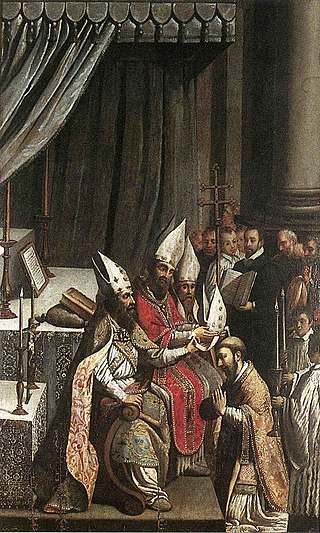
Apostolic succession is the method whereby the ministry of the Christian Church is considered by some Christian denominations to be derived from the apostles by a continuous succession, which has usually been associated with a claim that the succession is through a series of bishops. Those of the Anglican, Church of the East, Eastern Orthodox, Hussite, Moravian, Old Catholic, Oriental Orthodox, Catholic and Scandinavian Lutheran traditions maintain that "a bishop cannot have regular or valid orders unless he has been consecrated in this apostolic succession". These traditions do not always consider the episcopal consecrations of all of the other traditions as valid.
A bishop is an ordained member of the clergy who is entrusted with a position of authority and oversight in a religious institution. In Christianity, bishops are normally responsible for the governance and administration of dioceses. The role or office of the bishop is called episcopacy. Organizationally, several Christian denominations utilize ecclesiastical structures that call for the position of bishops, while other denominations have dispensed with this office, seeing it as a symbol of power. Bishops have also exercised political authority within their dioceses.

The Church of Sweden is an Evangelical Lutheran national church in Sweden. A former state church, headquartered in Uppsala, with around 5.6 million members at year end 2021, it is the largest Christian denomination in Sweden, the largest Lutheran denomination in Europe and the third-largest in the world, after the Ethiopian Evangelical Church Mekane Yesus and the Evangelical Lutheran Church in Tanzania.

The Evangelical Lutheran Church of Finland is a national church of Finland. It is part of the Lutheran branch of Christianity. The church has a legal position as a national church in the country, along with the Orthodox Church of Finland.
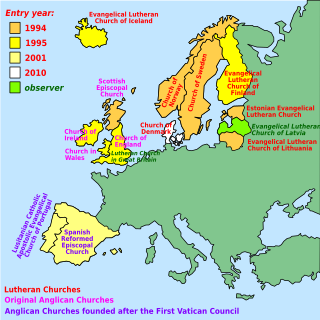
The Porvoo Communion is a communion of 15 predominantly northern European Anglican and Evangelical Lutheran churches, with a couple of far-southwestern European church bodies of the same denomination. It was established in 1992 by a theological agreement entitled the Porvoo Common Statement which establishes full communion between and among these churches. The agreement was negotiated in the town of Järvenpää in Finland, but the communion's name comes from the nearby city of Porvoo, where a joint Eucharist was celebrated in Porvoo Cathedral after the formal signing in Järvenpää.

The Church of Iceland, officially the Evangelical Lutheran Church of Iceland, is the national church of Iceland. The church is Christian and professes the Lutheran faith. It is a member of the Lutheran World Federation, the Porvoo Communion, the Communion of Protestant Churches in Europe, and the World Council of Churches.
Confessional Lutheranism is a name used by Lutherans to designate those who believe in the doctrines taught in the Book of Concord of 1580 in their entirety. Confessional Lutherans maintain that faithfulness to the Book of Concord, which is a summary of the teachings found in Scripture, requires attention to how that faith is actually being preached, taught, and put into practice. Confessional Lutherans believe that this is a vital part of their identity as Lutherans.
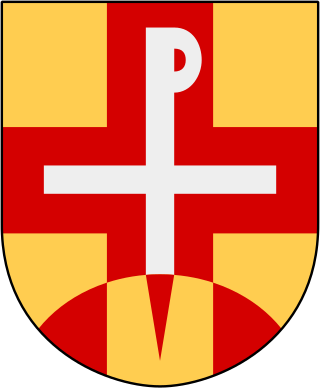
The Mission Province is a Swedish independent ecclesiastical province founded by members of the Church of Sweden who are opposed to the ordination of women to the priesthood and episcopate. The province, which aligns with Confessional Lutheranism, considers itself as a free-standing diocese within the Church of Sweden, a position rejected by the church itself. The Mission Province was founded on 6 September 2003 and shares altar and pulpit fellowship with those in the Communion of Nordic Lutheran Dioceses, in addition to being a member of the International Lutheran Conference.

The term Evangelical Catholic is used in Lutheranism, alongside the terms Augsburg Catholic or Augustana Catholic, with those calling themselves Evangelical Catholic Lutherans or Lutherans of Evangelical Catholic churchmanship stressing the catholicity of historic Lutheranism in liturgy, beliefs, practices, and doctrines. Evangelical Catholics teach that Lutheranism at its core "is deeply and fundamentally catholic". The majority of Evangelical Catholic Lutheran clergy and parishes are members of mainstream Lutheran denominations.
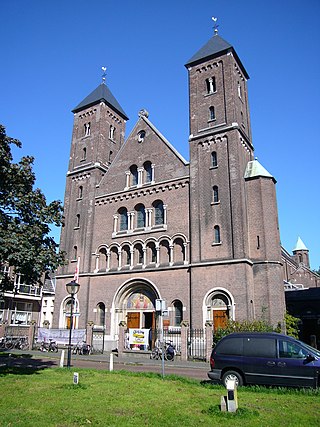
The Union of Utrecht of the Old Catholic Churches, most commonly referred to by the short form Union of Utrecht, is a federation of Old Catholic Churches, nationally organized from schisms which rejected Roman Catholic doctrines of the First Vatican Council in 1870; its member churches are not in communion with the Roman Catholic Church.
Catholicity is a concept of pertaining to beliefs and practices that are widely accepted by numerous Christian denominations, most notably by those Christian denominations that describe themselves as catholic in accordance with the Four Marks of the Church, as expressed in the Nicene Creed formulated at the First Council of Constantinople in 381: "[I believe] in one, holy, catholic, and apostolic Church." The English adjective catholic is derived from the Ancient Greek adjective καθολικός, meaning "general", "universal". Thus, "catholic" means that in the Church the wholeness of the Christian faith, full and complete, all-embracing, and with nothing lacking, is proclaimed to all people without excluding any part of the faith or any class or group of people. An early definition for what is "catholic" was summarized in what is known as the Vincentian Canon in the 5th century Commonitory: "what has been believed everywhere, always, and by all."
The Vicariate Apostolic of Northern Germany, known for most of its existence as the Vicariate Apostolic of the NorthernMissions, was a Catholic missionary jurisdiction established on 28 April 1667. It belonged to a vicar apostolic in predominantly Protestant Northern Europe.

Anglican interest in ecumenical dialogue can be traced back to the time of the Reformation and dialogues with both Orthodox and Lutheran churches in the sixteenth century. In the nineteenth century, with the rise of the Oxford Movement, there arose greater concern for reunion of the churches of "Catholic confession". This desire to work towards full communion with other denominations led to the development of the Chicago-Lambeth Quadrilateral, approved by the Third Lambeth Conference of 1888. The four points were stipulated as the basis for church unity, "a basis on which approach may be by God's blessing made towards Home Reunion":
The Nordic Catholic Church, formerly known as the Lutheran Free Synod of Norway, is an Old Catholic church body based in Norway, of high church Lutheran patrimony. The Nordic Catholic Church is a member of the Union of Scranton.
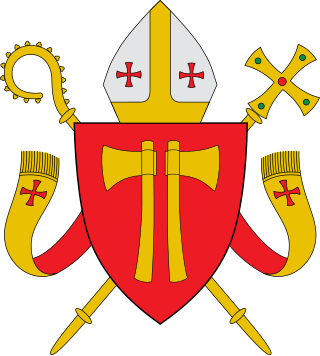
The Diocese of Oslo is an exempt Latin Church diocese of the Catholic Church located in the city of Oslo in Norway.
Matti Kalevi Väisänen is a former priest of Evangelical Lutheran Church of Finland and the bishop of independent Luther Foundation ordained by Swedish-based Missionsprovinsen, an ecclesiastical province that opposes ordination of women. He graduated doctor of theology from University of Helsinki in 2007. In 2013 Väisänen ordained Risto Soramies as the first bishop of the Evangelical Lutheran Mission Diocese of Finland.

The Old Apostolic Lutheran Church of America (OALC) is a Firstborn Laestadian church in North America. Firstborn Laestadians are a subgroup within Laestadianism. The Old Apostolic Lutheran Church originated in the 1890s. In the Nordic Firstborn Laestadian revival, the movement works within the official Church of Sweden, which is also called the "Lutheran Folk Church". The Church of Sweden has for a long time recognized the Laestadian movement and has allowed them to hold their own services in the state churches, both before and after the separation of church and state. Even in America it still has a relationship with the Church of Sweden.
The Mission Diocese, officially the Evangelical Lutheran Mission Diocese of Finland, is an independent confessional Lutheran "ecclesial structure" in Finland. The Mission Diocese considers itself to be "part of ‘the one, holy, catholic and apostolic church’" to be "truly a church" and to act "fully independently as a church", although it has not applied for state-recognition as a registered religious community. The Mission Diocese has its origins in the conservative movements of the Evangelical Lutheran Church of Finland (ELCF) and it self-identifies as existing in the same continuum of Lutheran faith and congregational life of the ELCF whose spiritual heritage it cherishes, yet not being part of its administrative structures.

Risto Matti Soramies is the first bishop of the Evangelical Lutheran Mission Diocese of Finland since 4 May 2013. He was ordained by Matti Väisänen, a bishop of the Mission Province of Sweden and Finland.
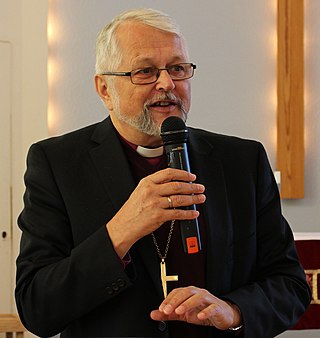
Evangelical Lutheran Diocese of Norway is a Lutheran diocese in Norway, founded in Kautokeino in 2013. Branched out from the "Church of Norway in Exile", the bishop of the diocese is Thor Henrik With.
References
- ↑ Ross, Paula Schlueter (28 January 2016). "Nordic Lutheran churches seek ILC membership". Lutheran Church–Missouri Synod . Retrieved 7 May 2021.
- 1 2 Block, Mathew (13 June 2019). "Swedish Lutherans consecrate new bishop". International Lutheran Council . Retrieved 7 May 2021.
- ↑ Väisänen, Matti; Anttinen, Jyrki (15 August 2010). "Finnish Lutheran Bishop defrocked; defenses offered". LOGIA. Retrieved 7 May 2021.
Missionsprovinsen defines itself as a non-geographical diocese in the tradition of the churches of Sweden and Finland.
- 1 2 3 "Lutherans Consecrate Roland Gustafsson As Mission Bishop for Sweden and Finland". Scandinavia House. Retrieved 7 May 2021.
- ↑ "Risto Soramies new Bishop for Luther Foundation". Finland Times. 17 March 2013. Retrieved 7 May 2021.
- 1 2 3 Roland Gustafsson; Risto Soramies; Thor Henrik With (7 November 2015). "Communion of Nordic Lutheran Dioceses" (PDF). Retrieved 7 May 2021.
